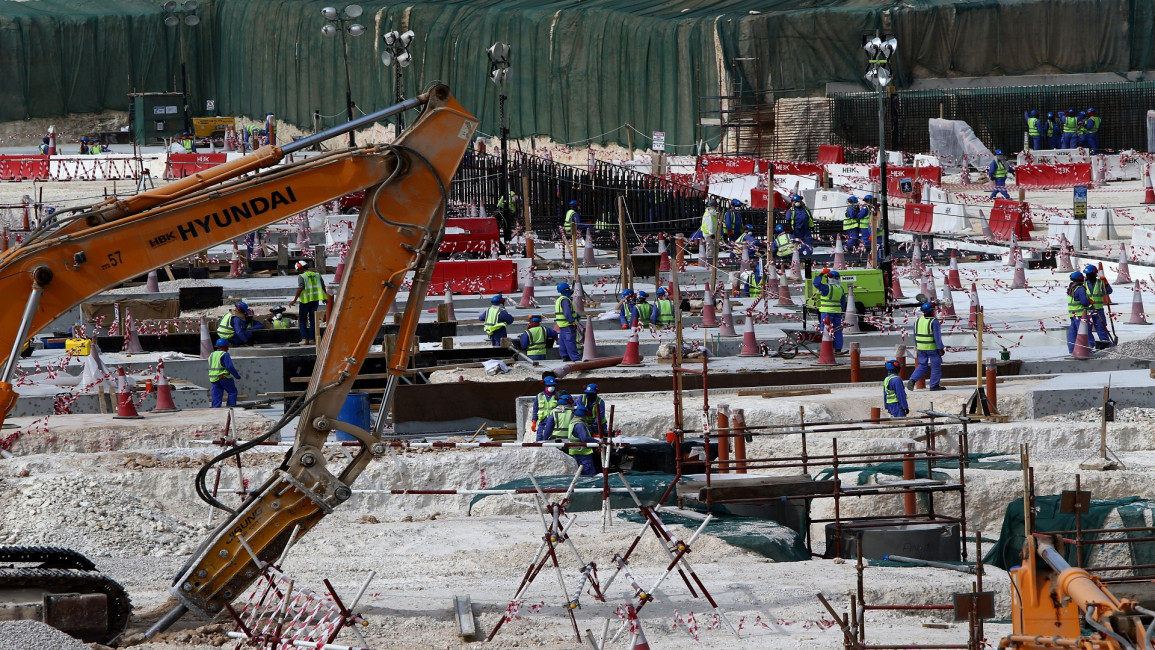Qatar developer spends $2.5m on 'worker locating' technology
Qatar developer spends $2.5m on 'worker locating' technology
A new device is to be used by a Qatar-based developer to track and locate migrant workers in labour camps, amid criticism and human rights concerns.
2 min read
Will the new device affect workers' privacy? [AFP]
A Qatar-based developer has signed a $2.5m contract with a California firm for a new device to be used to track construction workers living in its new housing projects, built as part of Qatar's infrastructure projects ahead of its hosting of the 2022 FIFA World Cup.
The deal was made earlier this month between the Qatari company Daruna Development and data software solutions and infrastructure provider Sysorex.
Concerns have already been raised about the device, particularly with regard to the potential for it to be used to control workers, and in light criticism by NGOs of Qatar's record on human rights.
"The new technology may have some positive uses, but the Qatari authorities, Daruna and the developers must ensure its application respects the rights of migrant workers, particularly the rights to privacy and freedom of movement, and does not enable businesses to tighten existing conditions of forced labour", Mustafa Qadri of Amnesty International told Doha News.
Under the country's widely criticised Kafala (sponsorship) system, employers confiscate their workers' passports and control their movement. Following the Nepal earthquake last May, most Nepalese workers were not allowed to return home for family funerals.
On the other hand, Sysorex CEO Nadir Ali said that AirPatrol, the mobile device locationing and analytics system, would "help develop the infrastructure for the 'smart communities' of the future".
"The solution includes networking the community with more than 1,000 of Sysorex's AirPatrol sensors to provide location-based services and security as well as insight into how residents flow through the community, which facilities are most popular, and where improvements can be made," the companies said in a statement after signing the contract.
Ali told non-profit publication Next City that little blue boxes would be set up around each housing project, picking up Wifi, RFID or Bluetooth signals from any device.
"Say there's a disaster, how many folks are there? Or some sort of riot going on, our technology shows where people are and helps to manage those types of situations", Ali added, commenting on the benefits of AirPatrol.
The deal was made earlier this month between the Qatari company Daruna Development and data software solutions and infrastructure provider Sysorex.
Concerns have already been raised about the device, particularly with regard to the potential for it to be used to control workers, and in light criticism by NGOs of Qatar's record on human rights.
"The new technology may have some positive uses, but the Qatari authorities, Daruna and the developers must ensure its application respects the rights of migrant workers, particularly the rights to privacy and freedom of movement, and does not enable businesses to tighten existing conditions of forced labour", Mustafa Qadri of Amnesty International told Doha News.
Under the country's widely criticised Kafala (sponsorship) system, employers confiscate their workers' passports and control their movement. Following the Nepal earthquake last May, most Nepalese workers were not allowed to return home for family funerals.
On the other hand, Sysorex CEO Nadir Ali said that AirPatrol, the mobile device locationing and analytics system, would "help develop the infrastructure for the 'smart communities' of the future".
"The solution includes networking the community with more than 1,000 of Sysorex's AirPatrol sensors to provide location-based services and security as well as insight into how residents flow through the community, which facilities are most popular, and where improvements can be made," the companies said in a statement after signing the contract.
Ali told non-profit publication Next City that little blue boxes would be set up around each housing project, picking up Wifi, RFID or Bluetooth signals from any device.
"Say there's a disaster, how many folks are there? Or some sort of riot going on, our technology shows where people are and helps to manage those types of situations", Ali added, commenting on the benefits of AirPatrol.


![President Pezeshkian has denounced Israel's attacks on Lebanon [Getty]](/sites/default/files/styles/image_684x385/public/2173482924.jpeg?h=a5f2f23a&itok=q3evVtko)



 Follow the Middle East's top stories in English at The New Arab on Google News
Follow the Middle East's top stories in English at The New Arab on Google News


